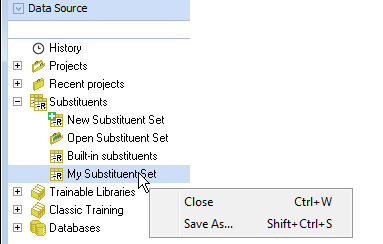Substituents
Substituents in ACD/Percepta is a special type of Projects that can used as a source of structural fragments for generating analogs in Structure Designer. Instead of full molecules, the Substituent sets contain disconnected structural fragments with the attachment point labeled as "R". ACD/Percepta comes with a built-in set of substituents that incorporates 16036 distinct structural moieties. The common way to create custom substituent sets is to run the tools provided in Fragmentate menu in the Spreadsheet workspace against your set of compounds. These tools include Retrosynthetic fragmentation designed with synthetic accessibility in mind, as well as Find and Replace fragments tool that uses a reaction database file that defines custom fragmentation rules.

- New Substituent Set – select to create an empty project and edit it in the Spreadsheet workspace. Here you can from create a new set of substituents from scratch. Note that the built-in Structure Editor displays a special tool that allows you to mark the attachment point "R" when editing the structures in a Substituents project.
- Open Substituent Set – click to open any of the previously saved set of substituents as CHS or PCB file.
- My Substituent Set – a default name that is given to a new project before it is saved and named by the user. Substituent sets created by automatic tools are given other default names, such as Retrosynth or ReplacedFragments.
- All currently opened Substituent sets are listed under the Substituents node in the Data source panel. The user can switch between them by selecting the one of interest.
Right-click any substituent set to close or save it.
Similarly to usual projects, the substituent files that are currently closed, by have been most recently opened in ACD/Percepta are listed under the Recent projects node. Select any of these previously saved file to quickly re-open it.